复习专题倒装句 复习
英语倒装句复习要点

NOT是否定词,完全 否定词和少部分不完 全否定次放句首要完 全倒装
A) did they change
B) they changed
C) changed they
D) they did change
3.NAo)wthheerfelo_w__e_r_sB_waesriensmo ybegaaurdtiefunl.
that company.
注意几个容易出错的场合:
①Not until位于句首引导状语从句,或 only位于句首修饰状语从句时,从句不倒 装,主句倒装。
Examples
Not until he was eight, did he go to school. 直到8岁他才去上学。 Only when the war was over was he able to get happily back to work. 只有当战争结束,他才能高高兴兴回去工作。
用作频率状语的 副词often, always, every, other day,以 及程度副词so或 表示“也”的so 位于句首时;
only位于句首修 饰状语时;
as位于句首引导 让步状语从句时; ⑥虚拟条件句省 略if时。
Examples
① Out rushed the children. ② Look! Here come the bus! ③ Often do I go there with them. ④ So busy is she that she has no time to spare. ⑤ Were I you, I would take the position in
②以下情况的主谓都不倒装:表示时间、地 点、方位的副词位于句首,其主语是人称代 词时;so位于句首表示强调时;only位于 句首不修饰状语或状语从句时。
语法专题复习倒装句部分倒装完全倒装和语序颠倒

语法专题复习倒装句(部分倒装、完全倒装和语序颠倒)一.知识梳理:1.完全倒装:1)There be 结构2)某些表时间、方位、地点的副词或介词短语放在句首3)作表语的形容词、过去分词、现在分词放在句首2.部分倒装:1)Only+状语2)表否定的副词、介词短语或连词放在句首3)……也如此类(So/Neither/Nor)位于句首4)Such/So……that 如此……以致……5)虚拟类(Were/Should/Had)放在句首6)祝愿类May sb do3.语序颠倒:1)表语/状语/动词原形+as/though+主语+谓语2)感叹句(How/What)3)(whatever/no matter what等)让步状语从句+主语+谓语4)The +比较级+主语+谓语,the +比较级+主语+谓语二.观察并记忆:1.There stands an old temple on the top of the mountain.山顶上耸立着一座古庙。
2.Here comes a bus.车子来了。
3.The bell rang . In came our headmaster.铃响了。
我们校长进来了。
4.On the wall hang two photos.墙上挂着两张照片。
5.Present at the meeting were the teachers and the headmaster.出席会议的有老师和校长。
6.Gone are the days when they had to work hard day and night.日夜辛苦劳作的日子一去不复返。
7.Only when he knew the truth did he realize he was cheated.只有当他知道真相时他才意识到被骗。
8.If you don’t go there tomorrow , neither will I.如果你明天不去,我也不去。
复习专题 倒装句重点和解题方法

复习专题倒装句重点和解题方法一、倒装句1.— I have never visited a paper factory.— .A. So have IB. I haven't nowC. Neither have I【答案】 C【解析】【分析】句意:-我从来没有参观过造纸厂。
-我也没去过。
根据句意可知这里表示的是否定的意思,故A可以先排除,因为so 的这个倒装的用法只能用在肯定句中,表示上面所说的情况也适用于另外一人。
在否定句应该用neither,当neither 位于句首时,应该用倒装的结构。
故选C。
【点评】考查倒装。
2.一 I didn't watch the football match on TV yesterday.一 . I got home too late to watch it.A. So did IB. Neither did IC. So I didD. Neither I did【答案】 B【解析】【分析】neither/nor+助动词+主语,译为“某人(物)也不……”,如果上句是否定句,那么下句就是也不是这种情况;so+助动词+主语,意为“某人(物)也是……”如果上句是肯定句,那么下句就是也是这种情况。
用于这种结构的主语是不同的人,如果是上下的两句的主语是同一个人,则用半倒装结构,so+主语+助动词,表示“某人的确是这样”。
句意:—我没看昨天的聊天节目,—我也没看,我到家太晚而没有看。
结合句意,故选B。
3.—I don't understand the story in the new unit. What about you, Bill?—_____.A. Neither I doB. Neither do IC. So do ID. So I do【答案】 B【解析】【分析】句意:——我不懂新单元中的故事。
你呢,比尔?——我也不懂。
表示前面所说的情况同样适用于后面的人或物,用完全倒装结构,前面是否定句用前者用neither/nor+系动词be/助动词/情态动词+主语。
复习语法倒装句练习题及

复习语法倒装句练习题及解答复习语法倒装句练习题及解析1. 完全倒装句练习题a) Never have I seen such a beautiful sunset.b) Little did she know about his true intentions.c) Not only did he play the piano, but he also sang.d) Only when the sun sets do I feel at peace.e) Rarely does she complain about anything.这些句子中,主语和谓语动词的顺序颠倒,是完全倒装句的形式。
这种句式多用于强调句子开头的部分内容,或者是句子开头有否定词、副词、状语等情况。
2. 词序倒装句练习题a) Hardly had he finished his breakfast when the phone rang.b) Seldom have I heard such beautiful music.c) Scarcely had she left the house when it started raining.d) No sooner did he arrive at the airport than the flight was cancelled.e) Under no circumstances should you give up.这些句子中,助动词、情态动词或者是be动词放在主语之前,构成了词序倒装句。
这种句式常用于表示某一情况之后立即出现的另一情况。
3. 条件句中的倒装句练习题a) Had you studied harder, you would have passed the exam.b) Should you have any questions, feel free to ask.c) Were I in your shoes, I would make the same decision.d) Were it not for your help, we would have failed.e) Should it rain tomorrow, we will cancel the outdoor event.这些句子中,条件从句的谓语动词放在主语之前,构成了条件句中的倒装。
复习专题 倒装句专项练习题
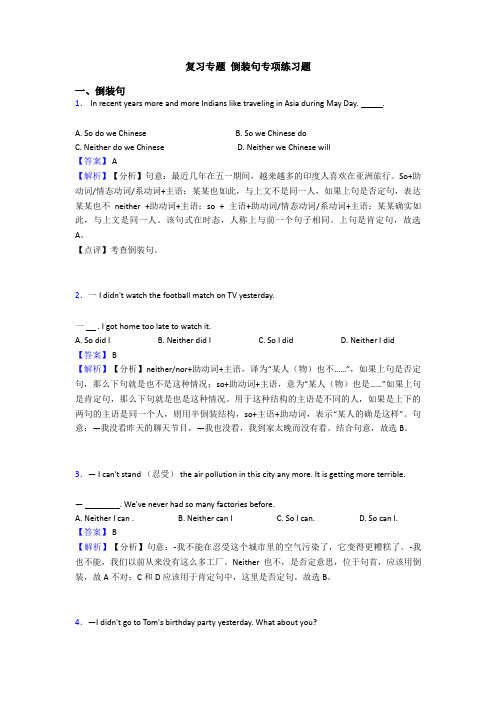
复习专题倒装句专项练习题一、倒装句1. In recent years more and more Indians like traveling in Asia during May Day. .A. So do we ChineseB. So we Chinese doC. Neither do we ChineseD. Neither we Chinese will【答案】 A【解析】【分析】句意:最近几年在五一期间,越来越多的印度人喜欢在亚洲旅行。
So+助动词/情态动词/系动词+主语:某某也如此,与上文不是同一人,如果上句是否定句,表达某某也不neither +助动词+主语;so + 主语+助动词/情态动词/系动词+主语:某某确实如此,与上文是同一人。
该句式在时态,人称上与前一个句子相同。
上句是肯定句,故选A。
【点评】考查倒装句。
2.一 I didn't watch the football match on TV yesterday.一 . I got home too late to watch it.A. So did IB. Neither did IC. So I didD. Neither I did【答案】 B【解析】【分析】neither/nor+助动词+主语,译为“某人(物)也不……”,如果上句是否定句,那么下句就是也不是这种情况;so+助动词+主语,意为“某人(物)也是……”如果上句是肯定句,那么下句就是也是这种情况。
用于这种结构的主语是不同的人,如果是上下的两句的主语是同一个人,则用半倒装结构,so+主语+助动词,表示“某人的确是这样”。
句意:—我没看昨天的聊天节目,—我也没看,我到家太晚而没有看。
结合句意,故选B。
3.— I can't stand (忍受) the air pollution in this city any more. It is getting more terrible.— ________. We've never had so many factories before.A. Neither I can .B. Neither can IC. So I can.D. So can I.【答案】 B【解析】【分析】句意:-我不能在忍受这个城市里的空气污染了,它变得更糟糕了。
倒装句总复习经典例题、习题1

倒装句总复习经典例题、习题1一、倒装句1. in this shop can you buy this kind of shoes.A. JustB. StillC. YetD. Only【答案】 D【解析】【分析】句意:你仅仅在这家商店买这种鞋子。
A.正好;B.仍然;C.还;D.仅仅。
in this shop是介词短语,can you用的是半倒装,所以用only+介词短语放句首时用半倒装,故选D。
【点评】考查半倒装,注意平时识记only+介词短语放句首时用半倒装。
2.—I couldn't work out the math problem.—________. I found ________ difficult for us to do it.A. So could I; thisB. Neither could I; itC. So can I; thatD. Neither I could; it【答案】 B【解析】【分析】句意:——我算不出这道数学题。
——我也不能。
我发现解决这个问题对于我们来说很难。
第一空考查倒装结构,我发现让我们做它很难。
上句发生一件事,下句有同样事情发生时,后面的句子用倒装结构,前面的句子是否定句,后面的倒装句用Neither引导,Neither+助动词+主语。
第二空考查it作形式宾语,主语+谓语+it+形容词+for sb. to do sth.it是形式宾语,动词不定式是真正的宾语,故选B。
【点评】此题考查倒装结构和it用法。
注意neither引导的倒装句用法和固定句式结构:主语+谓语+it+形容词+for sb. to do sth.3.– Will Tony go for the picnic at the weekend?– If I don't go, ______.A. so does heB. neither will heC. neither he does【答案】 B【解析】【分析】neither+主语+谓语,表示对前句所说内容的肯定,neither+谓语+主语,表示前句所说情况也适用于后者,句意:Tony周末去野餐吗?如果我不去,他也不去。
高考专题复习文言文倒装句复习课教案

文言文倒装句复习课【学习目标】1、知识与技能:通过对已学文言句式的分析,总结不同倒装句的特点和规律。
2、过程与方法:把理论运用于实践,面对陌生文句,利用所学知识解决实际问题。
3、情感态度与价值观:通过学习调动他们阅读古文的积极性,感受祖国语言文字独特的美,增强热爱祖国语言文字的感情,继承和弘扬优秀传统文化。
【学习重、难点】学习重点:重点了解宾语前置句和状语后置句的特点。
学习难点:利用掌握的倒装句的规律解决文言语句翻译中出现的问题。
【学习方法】归纳法、合作探究、讲练结合【教学课时】第一课时【学情分析】通过高中阶段文言文的学习,学生对基本的文言知识点有了一定的掌握,但缺乏归纳和总结,没有系统掌握,尤其是特殊文言句式,在文言文运用中存在一定问题,需要结合所学课本中的文言例句加以归纳,让学生自己总结出语法规律,形成能力。
这样,学生自己探究总结出来的要比老师直接讲授后再通过例句验证的方法更加有助于学生对于规律性知识的记忆。
【教学过程】一、导入二、教学目标1、能准确判断课内文言倒装句的类型并翻译。
2、通过分析归纳的方法,总结宾语前置、状语后置的特点。
3、尝试将理论运用于实践,面对陌生文句,利用所学知识解决实际问题。
三、考点解读1.考纲要求:理解与现代汉语不同的句式。
2.出题形式:结合翻译题考查。
四、知识梳理1、复习现代汉语句子成分。
2、文言倒装句类型:宾语前置、状语后置、定语后置、主谓倒置。
五、梳理探究(一)宾语前置1、探究一:翻译下列句子,找出它们的特点。
①大王来何操?②沛公安在?③彼且奚适也?句子特点:1.疑问句2.疑问代词作宾语规律一:疑问句中疑问代词作宾语时,宾语前置。
疑问代词有:何、谁、孰、胡、奚、曷、安、焉等2、探究二:翻译下列句子,找出它们的特点。
①忌不自信②然而不王者,未之有也。
③古之人不余欺也!④秦人不暇自哀。
句子特点:1.否定句2.代词作宾语规律二:否定句中代词作宾语时,宾语前置。
常见的否定词:不、未、莫、无、毋等常见的代词:余、吾、自、汝、尔、之3、探究三:翻译下列句子,找出它们的特点①句读之不知,惑之不解。
倒装句专题复习1

倒装句专题复习1一、倒装句1.Only in this place ________ such beautiful water and mountains.A. we can findB. can we findC. we foundD. found we【答案】 B【解析】【分析】句意:只有在这个地方我们可以找到如此美丽的水和山。
only+状语(介词短语)位于句首,其后要部分倒装,故把情态动词后助动词放在主语前,情态动词+主语+谓语的语序,故选B。
【点评】考查倒装句,注意only+状语(介词短语)位于句首,其后要部分倒装的用法。
2.—Will you go to the park tomorrow?—If you don't, ________.A. so do IB. so will IC. neither do ID. neither shall I 【答案】D【解析】【分析】句意:—明天你要去公园吗?—如果你不去,我也不去。
so +主语+助动词/情态动词/系动词:某某确实如此,与上文是同一人。
So+助动词/情态动词/系动词+主语:某某也如此,与上文不是同一人。
上文是否定句,下文表示某某也不,用neither +助动词+主语。
这些句式在时态上与前一个句子相同。
倒装句处在条件状语从句中,依据主将从现的原则,倒装句应用将来时态,故选D。
【点评】本题主要考查倒装句式,为了避免和前一句话的内容重复,英语中习惯用so,neither引导的倒装句。
其主语与前一句主语不是同一人。
So表示肯定,neighter表示否定。
其时态与前句的时态保持一致。
另外来考查了主将从现的用法,在条件,让步,时间等状语从句中,主句如果用将来时态,从句用一般现在时态。
3.—I've finished my homework, Tony.—_______.A. So have IB. So I haveC. So did ID. So I did【答案】 A【解析】【分析】句意:托尼,我已经完成了我的作业。
高考专题复习文言文倒装句专题复习课件40张

• 于东山之上出
于斗牛之间徘徊
•
状语后置 动词+以+宾语
• 1、谨庠序之教,申之以孝悌之义。 • 以孝悌之义申之 • 2、虽董之以严刑,振之以威怒。 • 以严刑董之 以威怒振之 • 3、私见张良,具告以事。 • 以事具告 • 4、公幸教以道,恩甚大。 • 以道教
状语后置 动词+乎+宾语
• 1、生乎吾前 ,其闻道也固先乎吾,吾从而师之。
定语后置 对点小练
3、令行于民期年,秦民之国都言初令之不便者以千数。
之国都言初令之不便 秦民
(2019年全国卷2)
译文:法令在民间实行一年,到国都诉说新法不便利的秦国百姓数以 千计。
4、巩州刘海构乱,既败,(中彦)籍民之从乱者数千人,惟论为首者 戮之。
从乱之民
译文:巩州刘海造反,失败之后,张中彦登记跟从作乱的百姓有数千 人,只是给为首的论罪并处死了他。
•
(2021年全国乙卷)
以法断之
译文:然而已经知道不能这样,又依照法律裁决,这是忍耐小的愤 怒而保全大的诚信。
状语后置 对点小练
• 3、一岁断狱,不过数十,威风猛于涣,而文理不及之。
于涣猛
(2018全国卷2《后汉书·王焕传》)
译文:(他)一年间断的案件,不过几十件。声威比王涣强,但在 文辞条理方面比不上他。
规律一:疑问句中 疑问代词作宾语时, 宾语前置。
1、汩余若将不及兮,恐年岁之不吾与。 时间过得很快,我好像要赶不上了,恐怕年岁不等待我。
2、然而不王者,未之有也。 这样却不能统一天下,不曾有过这样的事。
3、古人诚不我欺也! 古人的话确实没有欺骗我呀。
规律二:
否定句中代词作宾语时,宾语前置。
最新倒装句专题复习经典1
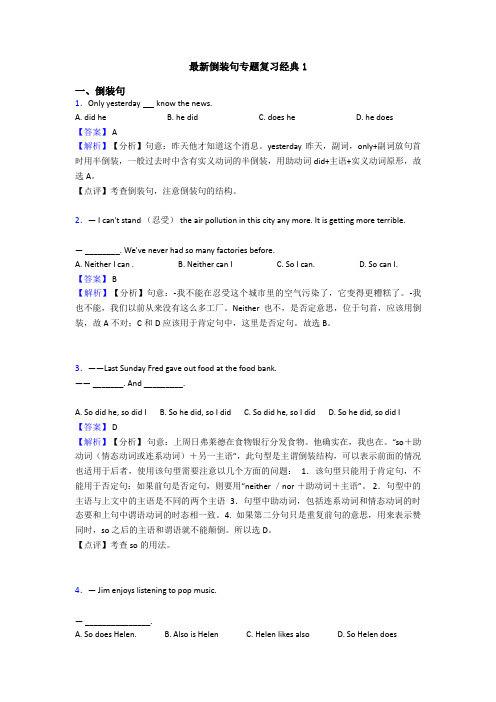
最新倒装句专题复习经典1一、倒装句1.Only yesterday know the news.A. did heB. he didC. does heD. he does【答案】 A【解析】【分析】句意:昨天他才知道这个消息。
yesterday昨天,副词,only+副词放句首时用半倒装,一般过去时中含有实义动词的半倒装,用助动词did+主语+实义动词原形,故选A。
【点评】考查倒装句,注意倒装句的结构。
2.— I can't stand (忍受) the air pollution in this city any more. It is getting more terrible.— ________. We've never had so many factories before.A. Neither I can .B. Neither can IC. So I can.D. So can I.【答案】 B【解析】【分析】句意:-我不能在忍受这个城市里的空气污染了,它变得更糟糕了。
-我也不能,我们以前从来没有这么多工厂。
Neither也不,是否定意思,位于句首,应该用倒装,故A不对;C和D应该用于肯定句中,这里是否定句。
故选B。
3.——Last Sunday Fred gave out food at the food bank.—— _______. And _________.A. So did he, so did IB. So he did, so I didC. So did he, so I didD. So he did, so did I【答案】 D【解析】【分析】句意:上周日弗莱德在食物银行分发食物。
他确实在,我也在。
“so+助动词(情态动词或连系动词)+另一主语”,此句型是主谓倒装结构,可以表示前面的情况也适用于后者,使用该句型需要注意以几个方面的问题:1.该句型只能用于肯定句,不能用于否定句:如果前句是否定句,则要用“neither /nor +助动词+主语”。
倒装句复习题(附答案)
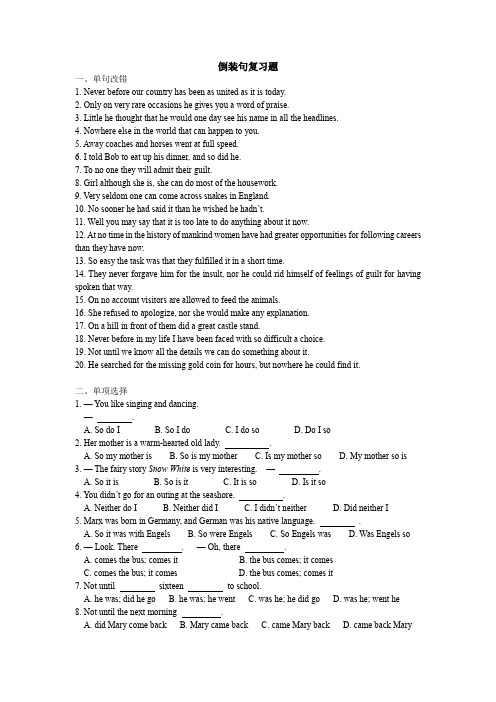
倒装句复习题一、单句改错1. Never before our country has been as united as it is today.2. Only on very rare occasions he gives you a word of praise.3. Little he thought that he would one day see his name in all the headlines.4. Nowhere else in the world that can happen to you.5. Away coaches and horses went at full speed.6. I told Bob to eat up his dinner, and so did he.7. To no one they will admit their guilt.8. Girl although she is, she can do most of the housework.9. Very seldom one can come across snakes in England.10. No sooner he had said it than he wished he hadn’t.11. Well you may say that it is too late to do anything about it now.12. At no time in the history of mankind women have had greater opportunities for following careers than they have now.13. So easy the task was that they fulfilled it in a short time.14. They never forgave him for the insult, nor he could rid himself of feelings of guilt for having spoken that way.15. On no account visitors are allowed to feed the animals.16. She refused to apologize, nor she would make any explanation.17. On a hill in front of them did a great castle stand.18. Never before in my life I have been faced with so difficult a choice.19. Not until we know all the details we can do something about it.20. He searched for the missing gold coin for hours, but nowhere he could find it.二、单项选择1. — You like singing and dancing.—.A. So do IB. So I doC. I do soD. Do I so2. Her mother is a warm-hearted old lady. .A. So my mother isB. So is my motherC. Is my mother soD. My mother so is3. — The fairy story Snow White is very interesting. —.A. So it isB. So is itC. It is soD. Is it so4. You didn’t go for an outing at the seashore. .A. Neither do IB. Neither did IC. I didn’t neitherD. Did neither I5. Marx was born in Germany, and German was his native language. .A. So it was with EngelsB. So were EngelsC. So Engels wasD. Was Engels so6. — Look. There . — Oh, there .A. comes the bus; comes itB. the bus comes; it comesC. comes the bus; it comesD. the bus comes; comes it7. Not until sixteen to school.A. he was; did he goB. he was; he wentC. was he; he did goD. was he; went he8. Not until the next morning .A. did Mary come backB. Mary came backC. came Mary backD. came back Mary9. Hardly when it began to rain.A. had he got homeB. he had got homeC. had got home heD. he home had got10. No sooner than he fell asleep.A. his head had touched the pillowB. had his head touched the pillowC. touched the pillow his head hadD. touched the pillow had his head11. Little .A. did I think of itB. I thought of itC. did think I of itD. thought of it I12. Seldom .A. Li Li her feelings showedB. did show Li Li her feelingsC. Li Li showed her feelingsD. does Li Li show her feelings13. Never before in her life such beautiful and precious jewelry.A. he sawB. did he seeC. has she seenD. she has seen14. Many a time the chess competition.A. had taken he part inB. he taken part in hadC. had he taken part inD. he had taken part in15. So busy that he has no time to spare.A. he wasB. was heC. he isD. is he16. with a bunch of flowers in her hand.A. A girl in cameB. Came in a girlC. In came a girlD. A girl came in17. Out .A. from behind a tall tree ran a little boyB. from behind a tall tree a little boy ranC. ran a little boy from behind a tall treeD. a little boy ran from behind a tall tree18. In the clear blue sky .A. does shine the bright moonB. the bright moon does shineC. shines the bright moonD. the bright moon shines19. Only in this way .A. we can well do itB. can we well do itC. we can do it wellD. can we do it well20. Only when he has finished his homework .A. is able to he play with his friends for a whileB. he able to play with is his friends for a whileC. is he able to play with his friends for a whileD. he is able to play with his friends for a while21. , he continued his study.A. Late as it wasB. As it was lateC. Late although it wasD. Although was it late22. Next door to us .A. lives an old man, who is an overseas ChineseB. does an old man live, who is an overseas ChineseC. an old man lives who is an overseas ChineseD. an old man who is an overseas Chinese does live23. as young as you, I would study hard.A. Was IB. Were IC. If I amD. If I was24. so hard, they wouldn’t have won such great success.A. Hadn’t they trainedB. If they wouldn’t trainC. Had they not trainedD. If they didn’t train25. Not a single word when he left.A. did speak heB. spoke heC. did he speakD. he spoke26. —I don’t think I can walk any further.—. Let’s stop here for a rest.A. Neither am IB. Neither can IC. I think soD. I don’t think so27. —It’s nice. Never before such a special drink!—I’m glad you like it.A. I have hadB. I hadC. have I hadD. had I28. John’s not been to London. .A. Ben isn’t eitherB. Neither is BenC. Nor Ben hasD. Neither has Ben29. , he does not know the answer.A. As Mr. Smith is a teacherB. As Mr. Smith is teacherC. A teacher as Mr. Smith isD. Teacher as Mr. Smith is30. so busy, I should go with you.A. Were I notB. Was I notC. If I am notD. I were not31. In the front of the classroom .A. is the desk for the teacherB. has the desk of the teacherC. it is a desk for the teacherD. has it a desk of the teacher32. On the top of the hill .A. does a temple standB. a temple stands thereC. stands a templeD. a temple stands33. Not only but also she likes singing.A. she likes paintingB. does she like paintingC. likes painting sheD. she does like painting34. Now .A. comes your turnB. does your turn comeC. your turn comesD. your turn does come35. happy!A. You may beB. May you beC. Be you mayD. May be you36. Only after they had discussed the matter for several hours a decision.A. they reachedB. did they reachC. they reachD. do they reach37. After the whistle rang, the coach appeared in the field. Behind him the team wearing black and white suits.A. hadB. walkedC. was followedD. led38. Not only give people relaxation and pleasure, but increase their knowledge of any kind.A. can travel; it canB. travel can; can itC. can travel; can itD. travel can; it can39. He treasured a notebook in which his bank account passwor d and his friends’ addresses.A. wroteB. recordedC. writtenD. were recorded40. His mother talked to him for several minutes while he was watching TV, but .A. little did hear heB. little did he hearC. little he heardD. did hear little he41. Mother told me to play with our little guest. , though unwillingly.A. So did IB. I didn’tC. So I didD. Neither I did42. the temperature is, water turns into steam.A. The high; the fastB. Higher; fasterC. The more higher; the more fasterD. The higher; the faster43. can you expect to get a pay rise.A. With hard workB. Although work hardC. Only with hard workD. Now that he works hard44. , mother will wait for him to have dinner together.A. However late is heB. However he is lateC. However is he lateD. However late he is45. I finally got the job I dreamed about. Never in all my life so happy!A. did I feelB. I feltC. I had feltD. had I felt46. Not until all the fish died in the river how serious the pollution was.A. did the villagers realizedB. the villagers realizedC. the villagers did realizeD. didn’t the villagers realize47. So difficult it to live in an English-speaking country that I determined to learn English well.A. I have feltB. have I feltC. I did feelD. did I feel48. got into the room the telephone rang.A. He hardly had; thenB. Hardly had he; whenC. He had not; thenD. Not had he; when49. , he is not yet ready to turn professional.A. Gifted though is heB. Gifted as is heC. Gifted as he isD. Though is he gifted50. His father became very excited when he heard the good news. .A. So became his motherB. So had his motherC. So did his motherD. So his mother was51. Only when to take off that she had left her handling at her office.A. the airbus began; did she realizeB. did the airbus begin; she realizeC. the airbus began; she realize;D. did the airbus begin; did she realize52. — I went into the cave on my own this afternoon.— In no case to do such a foolish thing again.A. should you be allowedB. you should be allowedC. should allow youD. should you allow53. , I have never seen anyone who’s as capable as John.A. As long as I have travelledB. Now that I have travelled so muchC. Much as I have travelledD. As I have travelled so much54. In recent years travel companies have succeeded in selling us the idea that the further we go, .A. our holiday will be betterB. our holiday will be the betterC. the better our holiday will beD. the better will our holiday be55. Not only interested in football but beginning to show an interest in it.A. the teacher himself is; all his students areB. the teacher himself is; are all his studentsC. is the teacher himself; are all his studentsD. is the teacher himself; all his students are56. — You forgot your purse when you went out.— Good heavens, .A. so did IB. so I didC. I did soD. I so did57. The old couple have been married for 40 years and never once with each other.A. they had quarreledB. they have quarreledC. have they quarreledD. had they quarreled58. — We have to stop talking here outside. .—Hurry up or we’ll be late.A. There goes the bellB. There does the bell goC. There the bell does goD. Goes the bell there59. It was only with the help of the local guide .A. was the mountain climber rescuedB. that the mountain climber was rescuedC. when the mountain climber was rescuedD. then the mountain climber was rescued60. Nancy didn’t come to the party last Saturday. , she would have made the party more exciting.A. If she cameB. Will she comeC. Had she comeD. Did she come61. Maybe you have been to many countries, but nowhere else such a beautiful palace.A. can you findB. you could findC. you can findD. could you find62. Of the making of good books there is no end; neither any end to their influence on man’s lives.A. there isB. there areC. is thereD. are there63. Little Jack is an orphan. , he has to make a living by himself.A. A child as he isB. Child as he isC. Child as is heD. A child though he is64. They have a good knowledge of English but little they know about German.A. haveB. didC. hadD. do65. , he talks a lot about his favourite singers after class.A. A quiet student as he may beB. Quiet student as he may beC. Be a quiet student as he mayD. Quiet as he may be a student66. In the dark forests , some are large enough to hold several English towns.A. stand many lakesB. lie many lakesC. many lakes lieD. many lakes stand67. about wild plants that they decided to make a trip to Madagascar for further research.A. So curious the couple wasB. So curious were the coupleC. How curious the couple wereD. The couple was such curious68. , Carolina couldn’t get the door open.A. Try as she mightB. As she might tryC. She might as tryD. Might she as try69. that we couldn’t catch up with him.A. So fast Bob ranB. So fast did Bob runC. Such fast ran BobD. Such fast did Bob run70. so hard, he wouldn’t have passed the exam.A. Had he not workedB. Hasn’t workedC. Shouldn’t he workD. Wouldn’t he work。
复习专题常见倒装句最全总结

复习专题常见倒装句最全总结复习专题常见倒装句最全总结⼀、倒装句1.–I usually go hiking with my friends.-- ____do I.A. NorB. SoC. Neither【答案】 B【解析】【分析】句意:⼀⼀我经常和朋发⼀起去徒步旅⾏。
⼀⼀我也是。
肯定句后跟”so+谓语+主语“,表⽰某⼈某物也……;否定句后跟"Neither/Nor+谓语+主语”,表⽰某⼈某物也不……。
本题前句是肯定句,故选B。
2.— I can't stand (忍受) the air pollution in this city any more. It is getting more terrible.— ________. We've never had so many factories before.A. Neither I can .B. Neither can IC. So I can.D. So can I.【答案】 B【解析】【分析】句意:-我不能在忍受这个城市⾥的空⽓污染了,它变得更糟糕了。
-我也不能,我们以前从来没有这么多⼯⼚。
Neither也不,是否定意思,位于句⾸,应该⽤倒装,故A不对;C和D应该⽤于肯定句中,这⾥是否定句。
故选B。
3.—I didn't go to Tom's birthday party yesterday. What about you?—________, because I was preparing for the exam all the time.A. Neither was IB. Neither am IC. Neither did ID. Neither do I【答案】 C【解析】【分析】句意:昨天我没有去汤姆的⽣⽇宴会,你呢?——我也没去,因为我⼀直准备考试。
根据倒装句neither助动词-主语,表⽰主语也没去做上⾯的那件事情,根据题意可知是⽤⼀般过去时故助动词⽤did。
复习专题倒装句
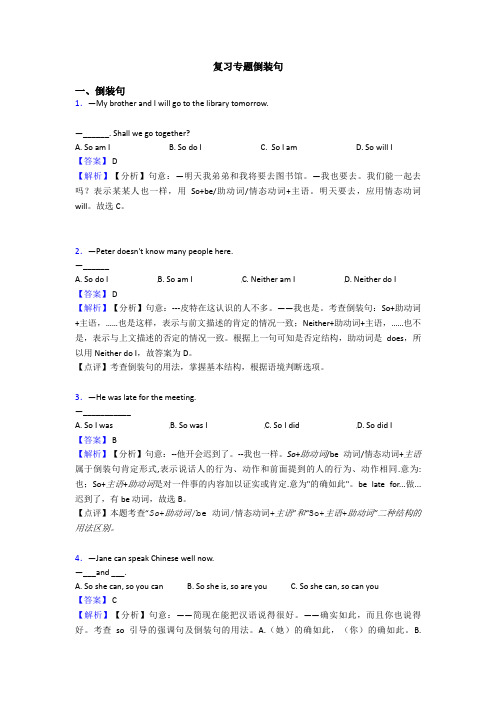
复习专题倒装句一、倒装句1.—My brother and I will go to the library tomorrow.—______. Shall we go together?A. So am IB. So do IC. So I amD. So will I【答案】 D【解析】【分析】句意:—明天我弟弟和我将要去图书馆。
—我也要去。
我们能一起去吗?表示某某人也一样,用So+be/助动词/情态动词+主语。
明天要去,应用情态动词will。
故选C。
2.—Peter doesn't know many people here.—______A. So do IB. So am IC. Neither am ID. Neither do I【答案】 D【解析】【分析】句意:---皮特在这认识的人不多。
——我也是。
考查倒装句:So+助动词+主语,……也是这样,表示与前文描述的肯定的情况一致;Neither+助动词+主语,……也不是,表示与上文描述的否定的情况一致。
根据上一句可知是否定结构,助动词是does,所以用Neither do I,故答案为D。
【点评】考查倒装句的用法,掌握基本结构,根据语境判断选项。
3.—He was late for the meeting.—___________A. So I wasB. So was IC. So I didD. So did I【答案】 B【解析】【分析】句意:--他开会迟到了。
--我也一样。
So+助动词/be动词/情态动词+主语属于倒装句肯定形式,表示说话人的行为、动作和前面提到的人的行为、动作相同.意为:也;So+主语+助动词是对一件事的内容加以证实或肯定.意为"的确如此"。
be late for...做...迟到了,有be 动词,故选B。
【点评】本题考查“So+助动词/be动词/情态动词+主语”和“So+主语+助动词”二种结构的用法区别。
高中英语语法专题复习倒装句
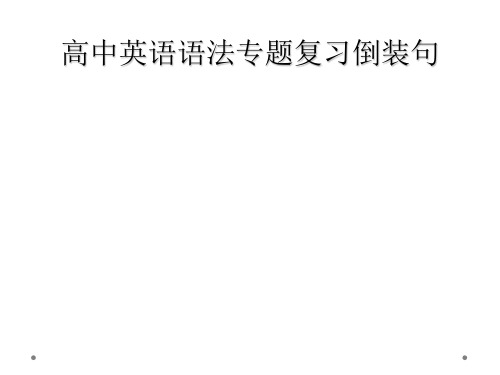
知识详解
部分倒装
9、用于某些表示祝愿的句子中。如: Long live the Chinese Communist Party.
跟踪练习
1.Scarcely _______ asleep _______ a knock at the door awakened him.
A. she had fallen; when B. she had fallen; than C. had she fallen; than D. had she fallen; when
Inside the pyramids are the burial rooms for the kings and queens and long passages to these rooms.
强调作用
They arrived at a farmhouse, in front which sat a small boy.
跟踪练习
9. ______ can you expect to get a rise. A. With hard work B. Although work hard C. Only with hard work D. Now that he works hard
10. _____ she wondered if she had made a mistake. A. Not until long afterwards that B. It was not until long afterwards that C. Not long until afterwards D. It was long afterwards until
知识详解
完全倒装
2、用于“here (there, now, then) + 不及物动词 +主语 (名词)”的句型中,或以out, in up down, away 等 副词开头的句子,以表示强调。如:
复习专题 倒装句(较难)
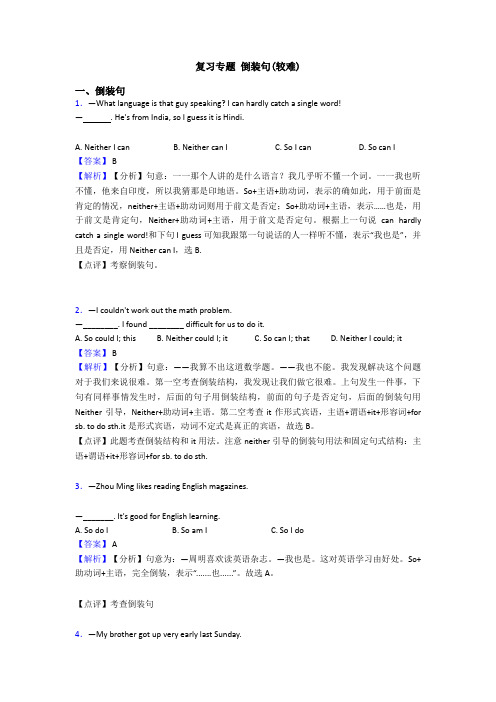
复习专题倒装句(较难)一、倒装句1.—What language is that guy speaking? I can hardly catch a single word!— . He's from India, so I guess it is Hindi.A. Neither I canB. Neither can IC. So I canD. So can I【答案】 B【解析】【分析】句意:一一那个人讲的是什么语言?我几乎听不懂一个词。
一一我也听不懂,他来自印度,所以我猜那是印地语。
So+主语+助动词,表示的确如此,用于前面是肯定的情况,neither+主语+助动词则用于前文是否定;So+助动词+主语,表示……也是,用于前文是肯定句,Neither+助动词+主语,用于前文是否定句。
根据上一句说can hardly catch a single word!和下句I guess可知我跟第一句说话的人一样听不懂,表示“我也是”,并且是否定,用Neither can I,选B.【点评】考察倒装句。
2.—I couldn't work out the math problem.—________. I found ________ difficult for us to do it.A. So could I; thisB. Neither could I; itC. So can I; thatD. Neither I could; it【答案】 B【解析】【分析】句意:——我算不出这道数学题。
——我也不能。
我发现解决这个问题对于我们来说很难。
第一空考查倒装结构,我发现让我们做它很难。
上句发生一件事,下句有同样事情发生时,后面的句子用倒装结构,前面的句子是否定句,后面的倒装句用Neither引导,Neither+助动词+主语。
第二空考查it作形式宾语,主语+谓语+it+形容词+for sb. to do sth.it是形式宾语,动词不定式是真正的宾语,故选B。
复习专题倒装句专项复习

复习专题倒装句专项复习一、倒装句1.——Last Sunday Fred gave out food at the food bank.—— _______. And _________.A. So did he, so did IB. So he did, so I didC. So did he, so I didD. So he did, so did I【答案】 D【解析】【分析】句意:上周日弗莱德在食物银行分发食物。
他确实在,我也在。
“so+助动词(情态动词或连系动词)+另一主语”,此句型是主谓倒装结构,可以表示前面的情况也适用于后者,使用该句型需要注意以几个方面的问题:1.该句型只能用于肯定句,不能用于否定句:如果前句是否定句,则要用“neither /nor +助动词+主语”。
2.句型中的主语与上文中的主语是不同的两个主语3.句型中助动词,包括连系动词和情态动词的时态要和上句中谓语动词的时态相一致。
4. 如果第二分句只是重复前句的意思,用来表示赞同时,so之后的主语和谓语就不能颠倒。
所以选D。
【点评】考查so的用法。
2.—Many students won 't take part in the after-school activities today.— .We have so much homework to do!A. So will IB. So do IC. Neither will ID. Neither do I【答案】 C【解析】【分析】句意:—今天许多学生不愿意参见课外活动。
—我也不愿意。
我们有那么多作业要做。
So+助动词+主语,表示与前面的肯定形式一致,表示也。
Neither+助动词+主语,表示与前面的否定形式一致,表示也不。
这两种部分倒装结构中的助动词与前一句的助动词一致,根据Many students won 't take part in the after-school activities today.可知此处won't表示否定形式,故用Neither+will+主语,故选C。
复习专题倒装句总复习经典例题、习题
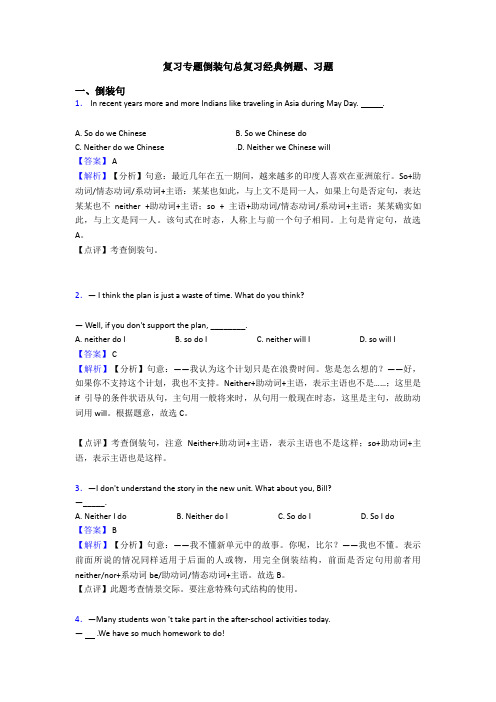
复习专题倒装句总复习经典例题、习题一、倒装句1. In recent years more and more Indians like traveling in Asia during May Day. .A. So do we ChineseB. So we Chinese doC. Neither do we ChineseD. Neither we Chinese will【答案】 A【解析】【分析】句意:最近几年在五一期间,越来越多的印度人喜欢在亚洲旅行。
So+助动词/情态动词/系动词+主语:某某也如此,与上文不是同一人,如果上句是否定句,表达某某也不neither +助动词+主语;so + 主语+助动词/情态动词/系动词+主语:某某确实如此,与上文是同一人。
该句式在时态,人称上与前一个句子相同。
上句是肯定句,故选A。
【点评】考查倒装句。
2.— I think the plan is just a waste of time. What do you think?— Well, if you don't support the plan, ________.A. neither do IB. so do IC. neither will ID. so will I【答案】 C【解析】【分析】句意:——我认为这个计划只是在浪费时间。
您是怎么想的?——好,如果你不支持这个计划,我也不支持。
Neither+助动词+主语,表示主语也不是……;这里是if引导的条件状语从句,主句用一般将来时,从句用一般现在时态,这里是主句,故助动词用will。
根据题意,故选C。
【点评】考查倒装句,注意Neither+助动词+主语,表示主语也不是这样;so+助动词+主语,表示主语也是这样。
3.—I don't understand the story in the new unit. What about you, Bill?—_____.A. Neither I doB. Neither do IC. So do ID. So I do【答案】 B【解析】【分析】句意:——我不懂新单元中的故事。
- 1、下载文档前请自行甄别文档内容的完整性,平台不提供额外的编辑、内容补充、找答案等附加服务。
- 2、"仅部分预览"的文档,不可在线预览部分如存在完整性等问题,可反馈申请退款(可完整预览的文档不适用该条件!)。
- 3、如文档侵犯您的权益,请联系客服反馈,我们会尽快为您处理(人工客服工作时间:9:00-18:30)。
复习专题倒装句复习一、倒装句1.—What language is that guy speaking? I can hardly catch a single word!— . He's from India, so I guess it is Hindi.A. Neither I canB. Neither can IC. So I canD. So can I【答案】 B【解析】【分析】句意:一一那个人讲的是什么语言?我几乎听不懂一个词。
一一我也听不懂,他来自印度,所以我猜那是印地语。
So+主语+助动词,表示的确如此,用于前面是肯定的情况,neither+主语+助动词则用于前文是否定;So+助动词+主语,表示……也是,用于前文是肯定句,Neither+助动词+主语,用于前文是否定句。
根据上一句说can hardly catch a single word!和下句I guess可知我跟第一句说话的人一样听不懂,表示“我也是”,并且是否定,用Neither can I,选B.【点评】考察倒装句。
2.If you go to his party tomorrow,A. won't, neither do IB. don't, neither will IC. don't, neither do ID. /, so do I 【答案】 B【解析】【分析】句意:如果你明天不参加他的聚会,我也不去。
分析:考查if引导的条件状语从句,通过时间状语tomorrow体现时间将来时,因此从句用一般现在时,主语是第二人称用do; 我也不去,为主句,同时前句为否定形式,因此用neither.故选 B【点评】考查if条件状语从句应使用主将从现。
3.—Many students won 't take part in the after-school activities today.— .We have so much homework to do!A. So will IB. So do IC. Neither will ID. Neither do I【答案】 C【解析】【分析】句意:—今天许多学生不愿意参见课外活动。
—我也不愿意。
我们有那么多作业要做。
So+助动词+主语,表示与前面的肯定形式一致,表示也。
Neither+助动词+主语,表示与前面的否定形式一致,表示也不。
这两种部分倒装结构中的助动词与前一句的助动词一致,根据Many students won 't take part in the after-school activities today.可知此处won't表示否定形式,故用Neither+will+主语,故选C。
【点评】此题考查倒装句。
注意助动词与前一句的助动词一致。
4.— Can you come to my birthday party, Lily?— If Jack does, ____________.A. so do IB. so I doC. so will I【答案】C【解析】【分析】句意:-Lily,你能来参加我的生日晚会吗?-如果Jack去,我就会去。
sodo I我也是;so I do.我的确如此;so will I.我也将会。
句中if引导的是条件状语从句,从句中用一般现在时态,主句用一般将来时态,倒装结构表示上面说的情况也适用于另外一人,即我也会去参加。
故应选C。
【点评】考查倒装句。
5.—Peter doesn't know many people here.—______A. So do IB. So am IC. Neither am ID. Neither do I【答案】 D【解析】【分析】句意:---皮特在这认识的人不多。
——我也是。
考查倒装句:So+助动词+主语,……也是这样,表示与前文描述的肯定的情况一致;Neither+助动词+主语,……也不是,表示与上文描述的否定的情况一致。
根据上一句可知是否定结构,助动词是does,所以用Neither do I,故答案为D。
【点评】考查倒装句的用法,掌握基本结构,根据语境判断选项。
6.—I'm waiting for the visitors very anxiously.—Look, here ______ these visitors.A. comeB. comesC. goD. goes【答案】 A【解析】【分析】句意:—我焦急地等待着来访者。
—瞧,这些来访者来了。
A. come动词,来;B. comes动词三单;来;C. go动词,走;D. goes动词三单,走。
根据语义可知,本句为倒装句,主语为these visitors,复数含义,谓语动词使用原形;come here来这里,而不是go here去这里。
故选:A。
【点评】此题考查倒装句。
7.—My brother got up very early last Sunday.—________.A. So I didB. So I wasC. So did I【答案】 C【解析】【分析】句意:——上星期天我哥哥起得很早。
——我也是。
so+谓语+主语,……也是,so+主语+谓语,的确是,此处表示某人也是,因此用so did I,故选C。
【点评】考查固定搭配,注意so+谓语+主语的用法。
8.—Jane can speak Chinese well now.—___and ___.A. So she can, so you canB. So she is, so are youC. So she can, so can you【答案】 C【解析】【分析】句意:——简现在能把汉语说得很好。
——确实如此,而且你也说得好。
考查so引导的强调句及倒装句的用法。
A.(她)的确如此,(你)的确如此。
B. (她)的确如此,你也是。
C. (她)的确如此,你也能。
“so+主语+系动词/助动词/情态动词”表示说话者对前句所提到的情况或事实表示赞同,意为“的确如此。
” “so+系动词/助动词/情态动词+(另一)主语”表示前句所述(肯定)情况也适用于另一主语,意为“……也如此。
”根据语境可知,题干要表达“(她)的确如此,而且你也能(说得好)”,所以可排除A项。
再因,前句包含情态动词can,所以倒装句也应用can,所以排除B项。
故答案选C。
【点评】考查强调句和倒装句的用法。
注意识记:So +主谓和So+谓主。
9.Only yesterday know the news.A. did heB. he didC. does heD. he does【答案】 A【解析】【分析】句意:昨天他才知道这个消息。
yesterday昨天,副词,only+副词放句首时用半倒装,一般过去时中含有实义动词的半倒装,用助动词did+主语+实义动词原形,故选A。
【点评】考查倒装句,注意倒装句的结构。
10.—I've finished my homework, Tony.—_______.A. So have IB. So I haveC. So did ID. So I did【答案】 A【解析】【分析】句意:托尼,我已经完成了我的作业。
——我也是。
So +助动词+主语,表示同样,也;So+主语+助动词,表示的确,确实。
结合句意,表示也做完了,故排除BD 两项。
根据I've 可知此处的助动词是have, 故选A。
【点评】考查倒装句的用法。
11.——Last Sunday Fred gave out food at the food bank.—— _______. And _________.A. So did he, so did IB. So he did, so I didC. So did he, so I didD. So he did, so did I【答案】 D【解析】【分析】句意:上周日弗莱德在食物银行分发食物。
他确实在,我也在。
“so+助动词(情态动词或连系动词)+另一主语”,此句型是主谓倒装结构,可以表示前面的情况也适用于后者,使用该句型需要注意以几个方面的问题:1.该句型只能用于肯定句,不能用于否定句:如果前句是否定句,则要用“neither /nor +助动词+主语”。
2.句型中的主语与上文中的主语是不同的两个主语3.句型中助动词,包括连系动词和情态动词的时态要和上句中谓语动词的时态相一致。
4. 如果第二分句只是重复前句的意思,用来表示赞同时,so之后的主语和谓语就不能颠倒。
所以选D。
【点评】考查so的用法。
12.—Will you go to the park tomorrow?—If you don't, ________.A. so do IB. so will IC. neither do ID. neither shall I【答案】D【解析】【分析】句意:—明天你要去公园吗?—如果你不去,我也不去。
so +主语+助动词/情态动词/系动词:某某确实如此,与上文是同一人。
So+助动词/情态动词/系动词+主语:某某也如此,与上文不是同一人。
上文是否定句,下文表示某某也不,用neither +助动词+主语。
这些句式在时态上与前一个句子相同。
倒装句处在条件状语从句中,依据主将从现的原则,倒装句应用将来时态,故选D。
【点评】本题主要考查倒装句式,为了避免和前一句话的内容重复,英语中习惯用so,neither引导的倒装句。
其主语与前一句主语不是同一人。
So表示肯定,neighter表示否定。
其时态与前句的时态保持一致。
另外来考查了主将从现的用法,在条件,让步,时间等状语从句中,主句如果用将来时态,从句用一般现在时态。
13.—They go to school early in the morning. —A. So do Tom.B. So Tom do.C. So does Tom.D. So Tom does.【答案】 C【解析】【分析】句意:一他们上午很早就去上学。
一汤姆也是。
so+主语+助动词/情态动词系动词:某某确实如此,与上文是同一人(物)。
so+助动词/情态动词系动词+主语:某某也如此,与上文不是同一人(物)。
这些句式在时态上与前一个句子相同。
根据上句是一般现在时,汤姆是第三人称单数,所以借助助动词does,故选C。
14.On the top of the small hill , and it has a long history of more than four hundred years.A. stands an old templeB. an old temple standsC. does an old temple standD. an old temple does stand【答案】 A【解析】【分析】句意:小山顶上矗立着一座古老的寺庙,它有四百多年的悠久历史。
